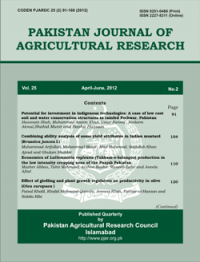SUPPLY, DEMAND, AND POLICY ENVIRONMENT FOR PULSES IN PAKISTAN
Saima Rani*, Hassnain Shah*, Umar Farooq** and Bushra Rehman**
ABSTRACT
The present study was undertaken to verify the various factors influencing the supply of pulses and to develop suitable demand relations. Therefore the paper fills an information gap regarding factors affecting the supply and demand of pulses in Pakistan. The present study focuses on two important pulses grown in the country namely gram (chickpea) and mung (mungbean). Using Nerlove's adjustment lag model as the basic framework supply and demand aspect has been studied at the national level, based on the time series data from 1974-75 to 2010-11. Acreage response results revealed that farm harvest prices, lagged area and good moisture availability at sowing time positively influence the area allocation decision of the farmers. But yield for mung and fertilizers price for both pulses were insignificant factors in influencing the farmers' decision to allocate land. Production of pluses mainly depends on area under the crop. Pulses area under irrigated conditions and sowing season rainfall positively influence the production of gram and mung. Technological factors by the time trend had given positive impact on the yield and production. Demand analysis revealed that own price elasticity of demand was inelastic and less than one for both pulses. This implied the supply and demand gap of pulses in the country. Thus decline in pulses consumption could be attributed to disproportionate increase in pulses price that would affect the poor segment of population in fulfilling the protein demand. Hence there is need to increase production through improving management practices and dissemination of improved technologies.
To share on other social networks, click on any share button. What are these?







